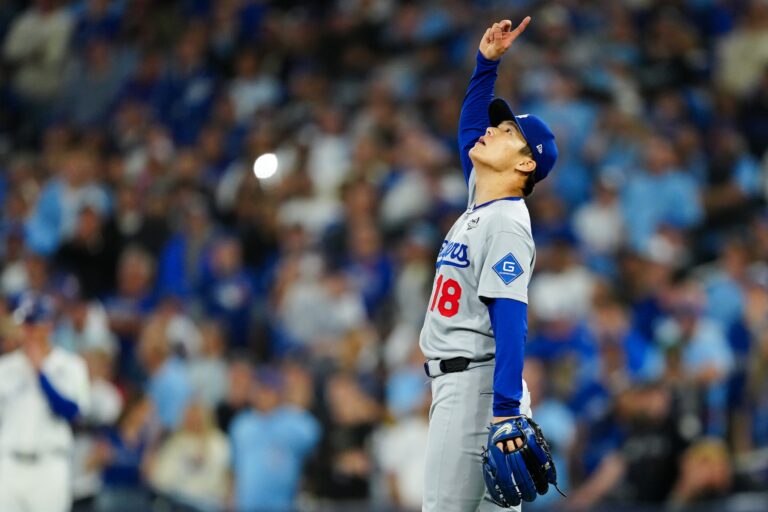The Toronto Blue Jays laid down a pretty good template right from the start of their victory Friday night in Game 1 of the World Series. Vladimir Guerrero Jr. worked a first-inning seven-pitch walk, then Alejandro Kirk worked a nine-pitch walk, and even though Dodgers starter Blake Snell escaped the jam without allowing a run the Blue Jays had done some important damage. A tense 29-pitch first inning, against a workhorse starter backed by a vulnerable bullpen, is a sound investment, in the same way that body blows are a sound investment in the early encounters of a scheduled 12-round boxing match. Snell finally crapped out in the sixth inning, leaving Los Angeles’s relievers to pick up 12 outs in a tie game, the first three of which would come with the bases loaded. What followed was a bloodbath: a nine-run sixth, and an 11-4 win.
Early in Game 2, proceedings seemed to be taking the same approximate shape. The Blue Jays put men on the corners before Dodgers starter Yoshinobu Yamamoto recorded his first out, and though Yamamoto pulled a Snell and escaped the jam, he needed 23 pitches to complete the trick. It was easy to imagine the relentless Blue Jays pestering Yamamoto to an untimely demise, and a quaking and sobbing Emmet Sheehan being dragged bodily out of the visitor’s bullpen, the Toronto crowd in a maniac frenzy. Then Yamamoto needed just 10 pitches to strand an infield single in the second inning, and used just 13 pitches in navigating around a small-ball run in the third. He got out of the fourth inning in what seemed like seconds, and settled into a groove so deep and comfortable that not even a deeply unappreciated mid-game Jonas Brothers performance could pull him out of it.
“He was in control the whole time,” reflected Los Angeles pitching coach Mark Prior, after the Dodgers’ 5-1 win. Perhaps feeling somewhat scrambled by the majesty of Yamamoto’s clutch performance, Prior struggled to translate his appreciation into a language more advanced than Shamsese: “His emotional heartbeat, however you want to say it, doesn’t seem fazed.” The first inning was the last time in Game 2 that Yamamoto required more than 14 pitches to collect three outs; he retired the final 20 batters he faced in the game on just 63 pitches. As it happened, these were the last 20 Blue Jays batters to step into the box Saturday night, as Yamamoto became the first starting pitcher since Johnny Cueto in 2015 to pitch a complete game in the World Series.
This was Yamamoto’s second consecutive complete game, following his 111-pitch gem against the Milwaukee Brewers on Oct. 14. Complete games are distressingly rare in the modern game. Just 29 were recorded in the 2025 regular season, in 2,430 contests. They are even more rare in the postseason, when the stakes are high and basically no pitcher in the sport is considered good enough to work out of significant danger. Yamamoto is now the first pitcher to throw consecutive postseason complete games since Curt Schilling did it for the Diamondbacks in 2001, per The Athletic. ESPN says Yamamoto is the first pitcher to retire the final 20 batters of a playoff game since 1956.
So the Dodgers now also have a template: Simply use only one pitcher, and have that pitcher post one of the best postseason performances of the last century. All it takes is a guy who can command every pitch-type ever invented.
“He could do what he wanted, whether it was fastball, cutter, curves, he just felt like he could go with anything,” marveled Prior. Statcast recognizes seven pitch-types in Yamamoto’s repertoire, including four that he throws at least 10 percent of the time. Saturday he threw six different pitches, and located at least one of each inside the zone, and got at least one swinging strike on all but his sinker. The Blue Jays, arguably the best and most discerning contact-hitting team in baseball, saw just enough of what they liked to make a bunch of shitty, frustrating outs on balls in play, and to allow the Dodgers to give their suspect bullpen a night off. It’s nice to have a starter who can provide his own relief. “He gives them different looks,” said Prior, “even though it’s the same guy.”
Dodgers first baseman Freddie Freeman said even he was flummoxed by Yamamoto’s pitch selection, telling ESPN’s Alden Gonzalez that he was amazed when his teammate ripped off consecutive sliders against Kirk in the fourth inning. What is fucked up about this is that Yamamoto had not thrown a single slider before this moment; what is even more fucked up is that Yamamoto did not throw another slider until the sixth inning, when he threw another pair of consecutive sliders, also to Kirk. Those are four of the six total sliders that Yamamoto threw Saturday night; the next time he faced Kirk, in the bottom of the ninth inning, he threw him a pair of back-to-back sinkers, two of the four total sinkers he threw in the entire game. Yamamoto used an entirely different repertoire of pitches against him than he used against the other nine Blue Jays hitters who stood in there. I earnestly do not know how Alejandro Kirk is supposed to be sane today.
Still, of these two teams, the Blue Jays should feel better about the state of the series, headed now to Los Angeles. Their deal seems far closer to replicable: They can expect to see more of that flammable Dodgers bullpen. It’s inevitable. “With the construct of the bullpen, we’re going to need them,” said Dave Roberts, after Game 1. “We have a long way to go, a lot of baseball, but they certainly have to make good pitches.” Los Angeles’s scheduled Game 3 starter, Tyler Glasnow, has pitched exactly zero complete games in his 10 years of major-league service. Poor Anthony Banda cannot hide forever.


